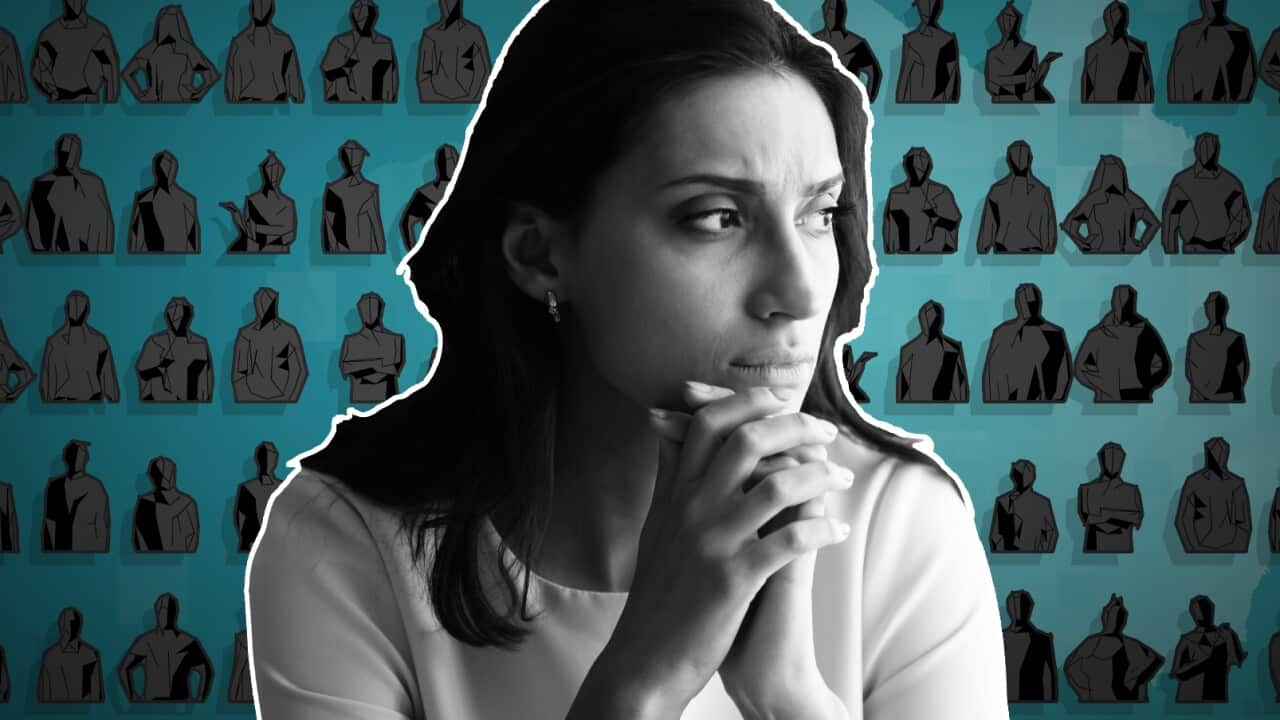Key Points
- More than three million Australians who experienced anxiety in the 2020-21 financial year
- One in five people had experienced a mental health condition in the last 12 months before the survey was taken.
This article contains references to suicide and self-harm.
Lehan is one of more than three million Australians who experienced anxiety in the 2020-21 financial year, making it the most common mental health condition in the country.
The 22-year-old student told SBS News it took a lot to get over the stigma, but there was relief in finally understanding what was going on inside.
“Seeing these things on paper and realising that it wasn't just like a fault or a flaw that I inherently had ... that was what really encouraged me to go out and seek help for it,” Lehan said.
The 2020-2021 National Study of Mental Health and Wellbeing, released on Friday by the Australian Bureau of Statistics (ABS), showed two in five people between the ages of 16 and 85 have had a mental health condition at some point in their life.
According to the report, one in five people had experienced a mental health condition in the last 12 months before the survey was taken.
Linda Fardell, program manager of Health and Disability Statistics at the ABS, said these are more commonly seen in women.
“Women were much more likely than men to experience a mental health condition. That held true for all types of mental health conditions except for substance abuse,” she said.
But it’s young people who were most affected.
“Overall, across all the conditions, young people were much more likely than older people to have anxiety disorders and also substance use.”
The survey found around half of women aged between 16 and 24 had reported a mental illness between 2020 and 2021.
A widespread problem
It’s the first time a similar survey has been completed since 2007. It found more than 3.3 million Australians experienced an anxiety disorder.
About 1.5 million people had an affective disorder, such as depression and obsessive compulsive disorder (OCD), and more than 650,000 people had a substance use disorder like alcohol or drug abuse.
More than three million people also experienced suicidal thoughts or behaviour.
How COVID-19 impacted mental health
Daniel Angus, a psychologist and deputy commissioner at the NSW Mental Health Commission, said COVID-19 lockdowns could have impacted the results of the survey.
“COVID has really resulted in significant impacts to mental health for all in the community,” he said.

Daniel Angus is a psychologist and deputy commissioner at the NSW Mental Health Commission. Credit: SBS
Ms Fardell of the ABS said there could be a couple of reasons for that.
“We think a driver for these results is the age effect. So, some people born outside Australia tend to be older and in general older people had lower rates of mental health conditions,” she said.
The ABS interviewed more than 5,500 adults for the survey, and will be releasing further data sets next year with more detail on cultural backgrounds.
Accessing treatment
The ABS also found more people are accessing help. More than two million people — or half of all Australians experiencing a mental health disorder — sought professional support over the year before the survey was taken.
Mr Angus of the NSW Mental Health Commission says many people are becoming more open about getting treatment.
“I think that people are seeking support more regularly, more consistently than perhaps they were before.
"But more than a quarter of those who sought help did not have their needs met, or only partially met."
Mr Angus said one issue he’s found is the accessibility of healthcare for people from culturally and linguistically diverse backgrounds (CALD).
“One of the biggest issues is the stigma attached to mental health problems in CALD populations,” he said. “The other challenges are also around trust and mistrust of services of programs available.”
He said it’s really important to promote culturally sensitive support services.
“We need to invest in bilingual staff, bilingual mental health services, bilingual psychologists, bilingual psychiatrists ... We have to do more in terms of building trust within those communities.”
Campaign to help multicultural youth access support
Lehan said as a person of Chinese-Australian background, they have faced challenges when first trying to get help.
“Once I started seeking clinical treatment, I had to shop around a bit for a psychologist that understood my experience,” they said.
Lehan is now a volunteer with headspace, helping other migrant and multicultural youth to get the support they need.
They said getting help from someone who understood their background was essential.
“It can be discouraging that the first few people you go to you feel like you can’t relate to them.”
Headspace released this week encouraging young people from CALD backgrounds to feel comfortable talking about mental health and seeking help if needed.
“I’m trying to help other people and spreading the message that mental health is important and it’s not something you should put aside. It’s as important as physical health,” Lehan said.
Readers seeking crisis support can contact Lifeline on 13 11 14, the Suicide Call Back Service on 1300 659 467 and Kids Helpline on 1800 55 1800 (for young people aged up to 25). More information and support with mental health is available at and on 1300 22 4636.
supports people from culturally and linguistically diverse backgrounds.












